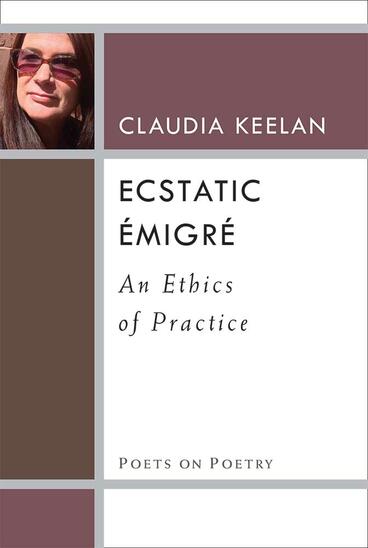A volume in the Poets on Poetry series, which collects critical works by contemporary poets, gathering together the articles, interviews, and book reviews by which they have articulated the poetics of a new generation.
Description
Most think of an émigré as one who leaves her native land to find home in another. Claudia Keelan, in essays both personal and critical, enlists poetic company for her journey, engaging both canonical and common figures, from Gertrude Stein to a prophetic Las Vegas cab driver named Caesar. Mapping her own peripatetic evolution in poetry and her nomadic life, she also engages with Christian and Buddhist doctrines on the virtues of dispossession.
Ecstatic Émigré pays homage to poets from Thoreau and Whitman to Alice Notley, all of whom share a commitment to living and writing in the moment. Keelan asks the same questions about the growth of flowers or the meaning of bioluminescence as she does about the poetics of John Cage or George Oppen. Her originality is grounded by the ways in which she connects poetic principles with the spiritual concepts of via negativa demonstrated both in St. John of the Cross and Mahayana Buddhism. In addition, her essays demonstrate an activist spirit and share a commitment to the passive resistance demonstrated in Martin Luther King, Jr.’s concept of the “beloved community” and philosopher Simone Weil’s dedication to “exile.”
Claudia Keelan has published eight books of poetry, most recently, New and Selected Poems: We Step into the Sea (2018) and O, Heart (2014). Her work has received the Beatrice Hawley Award and the Cleveland State University Poetry Prize, among other honors. She is a Distinguished Barrick Scholar and editor of the journal Interim at the University of Nevada, Las Vegas.
Reviews
“Keelan provides us with questions, new ways of viewing ourselves, our lives, our country, our past, and she does it in a most enjoyable way.”
—Rattle
“Keelan’s poetic, as capacious as it is exacting, defies easy categorization: her epistemological, ethical, and spiritual acuity permeates poems that are as attentive to the physical world as they are to the paradoxes of our failures to represent it.”
—Rain Taxi

